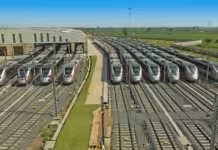Indian Railways, the world’s second-largest rail network, is taking a significant step in modernizing its infrastructure by constructing factory-built stations. Chandigarh station, revamped using modern technology, serves as a prime example of this innovative method and is set to be operational by year-end.
The government is currently redeveloping over 1,000 stations nationwide, with a focus on utilizing modular construction. This approach allows for stations to be built in factories and assembled on-site, drastically reducing construction time from 36 to 18 months. Modular construction offers significant advantages, including minimal disruption to train operations and reduced transportation of raw materials through densely populated areas.
Union Minister of Railways, Ashwini Vaishnaw, stated that if the Chandigarh model proves successful, it will be implemented in other locations, including Ajmer, Sambalpur, Satna, and Jabalpur. This method not only minimizes disruption to train operations but also enhances overall efficiency. The government plans to develop ten more stations using this modern approach, which promises to transform the railway infrastructure landscape across India.
The redevelopment of these stations is part of a broader initiative to provide contemporary amenities and improved services for passengers, demonstrating the potential of modular construction to revolutionize public infrastructure development.





